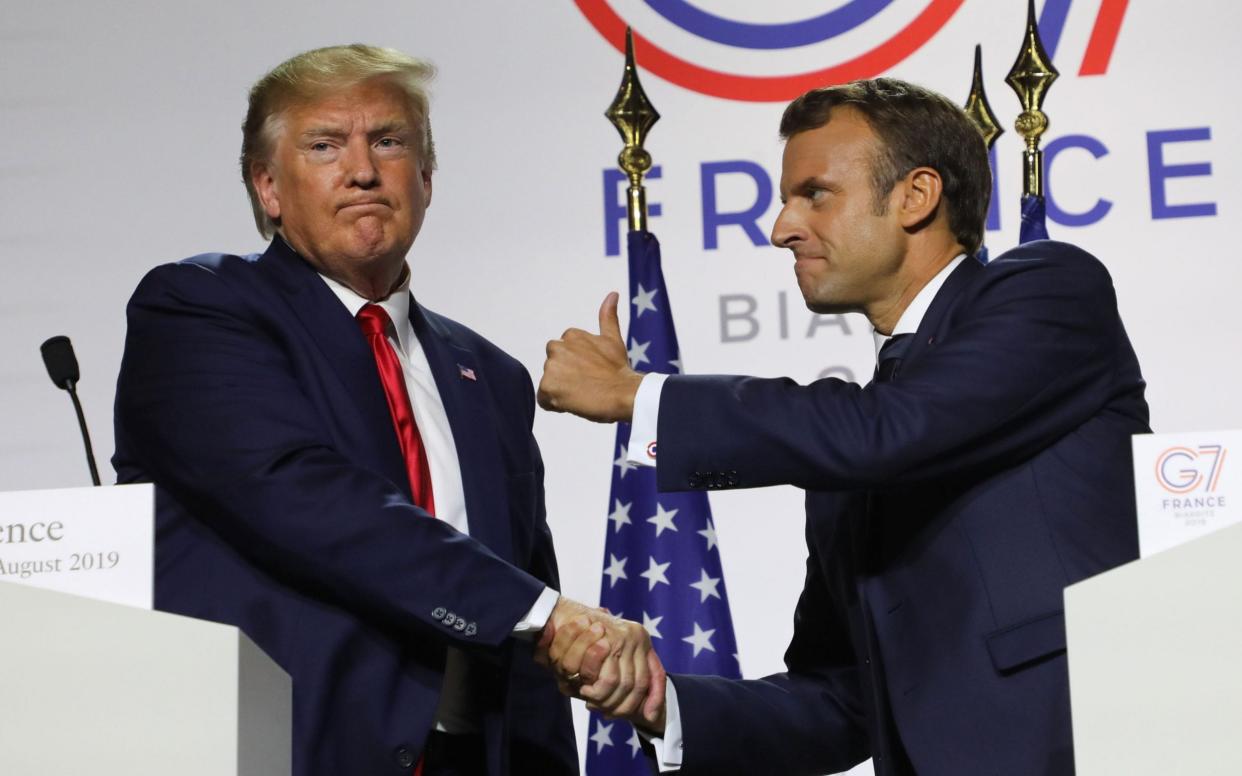Emmanuel Macron's strategy to combat American data domination

The global battle for digital ascendancy is being equated to the 20th-century nuclear arms race
Last week Emmanuel Macron shouted in alarm. Angela Merkel’s warning this week was more quietly worded, but no less urgent. The principal cogs of Europe’s political machine are moving in concert, the continent’s very security and sovereignty their concern.
Europe needs to “wake up” or face “a considerable risk that in the long run we will disappear geopolitically,” says the French president. Europe is facing “dependencies that I’m not sure are a good thing," says the German chancellor.
They are referring to the very real possibility of domination by countries – in all likelihood China and America – which master the 21st century’s key technological advances.
It is a battle that many liken to the 20th-century race to develop nuclear weapons, where the boundary between technology and geopolitics blurred; where the division between theoretical research and the cold hard application of power all too suddenly disappeared.
For Merkel the key issues are data and artificial intelligence (AI). “So many [European] companies have just outsourced all their data to US companies,” she said in Berlin on Tuesday, adding to her recent comments that: “Europe can do everything, including developing and operating its own data structure.”
For Macron, the fusion of technology and geopolitics is more profound still. “We haven’t thought [technology] through at all in terms of the strategic aspect,” he told The Economist this month.
"The most sensitive areas of Europe’s digital infrastructure, he said, now relied on US and Chinese superpowers. “In my opinion some elements must only be European.”

X-factor
Gaia-X is the beginning of a response. It is a German project to create an alternative to the data storage and processing power of global leaders in the field: Google, Amazon and Microsoft. From health services to tax collectors, critical public- and private-sector services in countries outside America increasingly rely upon the US trio.
Gaia’s manifesto says the aim is “to set up a high-performance, competitive, secure and trustworthy data infrastructure for Europe… based on European values.” It lists seven such values, notably “data protection”, “digital sovereignty and self-determination”, and “European value creation".
The latter is critical. Kai-Fu Lee, formerly of Google China, has pointed out how any nation which fails to capitalise on the value of its own data could be subjugated by a foreign power that does.
In his vision such vassal countries will be forced to take subsidies “in exchange for letting the ‘parent’ nation’s AI companies continue to profit from the dependent country’s users. This kind of dependency would be tantamount to a new kind of colonialism.”
France’s plan to escape begins with what its Finance Minister Bruno LeMaire called “a trustworthy cloud to store our companies’ most sensitive data”.
He has co-opted local companies Dassault Systemes and OVH to work on the project and promises initial results as early as next month. German companies involved in Gaia-X include Deutsche Telekom, Deutsche Bank, Siemens and Bosch.
Has the horse bolted?
It will not be easy. “This is trying to re-run a race that has already been lost,” says cloud consultant Bill Mew. “Too little, too late. It’s not possible. You’re never going to be able to compete.”
He compared Franco-German cloud efforts to British Leyland, the ill-fated national carmaker that was founded in response to competition from global giants like Ford and Nissan, asking: “Will this be any more efficient or successful?”

A better solution, he suggested, was to prepare to compete in future “edge” computing, where more aspects of data storage and processing are carried out locally, rather than in huge, centralised server “farms” like those currently run by the US giants.
National governments, he suggests, face a “massive disadvantage” in the latter, but could set standards for local edge networks “especially in trusted data guardianship”.
Such moves, however, are not limited to Europe – nor the cloud. After two decades of expansion in which successful technology companies pursued – and were often granted – unfettered expansion across global markets, so-called “digital nationalism” is on the rise, fuelled by the recognition that certain companies may represent strategic, as well as economic, assets.
For example DeepMind, the global leader in AI, is based in London but was sold to Google for £400m. Some now mourn that sale as a loss of national significance.

If so, it may not be the last. Ian Hogarth, the engineer and entrepreneur, notes that Prowler is another UK company leading the world in AI; that Graphcore is a UK pioneer in specialised processors for machine learning; that Ocado is a world leader in automation; just as DarkTrace is in cybersecurity.
“What will the UK government do when Amazon, Google or Tencent make them a multi-billion dollar offer?” he asks. “At present, nothing. This is a good thing if you’re Google, Amazon or Alibaba looking to further cement your position – and indirectly a good thing for the US or China. Is it a good thing for the average UK citizen?”


